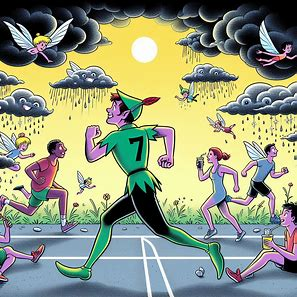Lessons from the Clouds: Finding Purpose Without a Fixed Path
As I gazed at the sky, a thought struck me. Clouds, with their ever-changing shapes and undefined forms, seem impossible to capture in a drawing or a painting. How do you depict something that has no fixed form? This contemplation led me to profound and mystical insights.
Despite their lack of
structure, form, or set identity, clouds hold a significant place in the grand
scheme of things. They possess the power to veil the blazing sun, obscure the
radiant moon, and even hide the distant stars.
At first glance,
clouds appear aimless, drifting lazily across the sky without a clear direction
or purpose. Yet, they play crucial roles in our world. Clouds bring weather
changes, gifting us with rain and snow, and they reflect and diffuse sunlight,
contributing to the beauty of our skies.
Our society often encourages us to define ourselves, establish a name, and leave behind a legacy. We are taught to carve out our own unique identity and make our mark for others to follow. But the clouds taught me a different lesson. Even without a fixed identity or clear purpose, one can still have immense value and significance in this world.
So, if you find
yourself wandering through life without a clear direction or a defined path, do
not worry. If your life lacks a fixed pattern or seems to be a series of random
events, take solace in the way clouds navigate the skies. They move with grace
and purpose, even when their forms are fleeting and their paths uncertain.
Embrace the journey of life as the clouds do. Move forward, even when the emerging patterns in your life are unclear or make little sense.
In the end, as you
look back on your life, you may realize that it was never about reaching a
specific destination. Life was always about the journey itself—the experiences,
the movements, and the moments along the way. Just like the clouds, you can
find beauty and purpose in your ever-changing path.
Harnessing Anger: The Key to Success and Self-Mastery
Dr. Paul Hawk, a noted psychologist, asserts that "anger is perhaps the most dangerous emotion for personal success." He observes that many people with potential for great achievement often sabotage their chances by losing their temper too easily.
The Bhagavad Gita also
warns against anger, stating that "anger destroys intelligence and leads
to one's downfall." It advises an "inward withdrawal,"
advocating for the control of the senses through the disciplined mind, much
like a charioteer controlling his horses with reins.
Anger, if left
unchecked, can pull you down to the lowest levels of prosperity and success,
potentially bringing about your own doom.
Yet, anger can also be a double-edged sword. Howard Hill notes that anger releases the hormone adrenaline, which can amplify our physical and mental capabilities, allowing us to perform extraordinary feats. This surge of energy, when harnessed correctly, can drive remarkable achievements.
Reflecting on this
duality, Ludwig Börne argued that "impatience, not patience, spurs people
to action and change." Mark Twain similarly contended that the role of a
newspaper is not merely to report facts but to provoke enough anger to inspire
action.
The wisdom of
Aristotle provides a nuanced perspective on anger: "Anyone can become
angry—that is easy. But to be angry with the right person, to the right degree,
at the right time, for the right purpose, and in the right way—is not within
everyone’s power and is not easy." This highlights the importance of
channeling anger appropriately to maintain balance and achieve success.
Unchecked, extreme
anger can lead to violence and irrational behavior, often described as
temporary madness. Lord Chesterfield (Philip Stanhope) suggests that true
strength lies in calm words and decisive actions, advising that we neither
succumb to hot-headedness nor fall into timidity.
To protect oneself
from the destructive nature of anger, it is crucial to keep things in
perspective and not let small issues provoke disproportionate reactions. This
aligns with the sentiment expressed by the poet Kalidasa in *Kumarasambhava*:
"Those whose minds remain untroubled even in the face of disturbance are
truly brave." It is this bravery and emotional control that pave the way
to achieving glory and success.
In summary, while
anger can be a source of powerful energy and motivation, it must be managed
wisely. By mastering our anger, we preserve our intelligence and ensure our
journey towards success remains steady and unimpeded.
IF HE EXIST
I drive joy there was a doctor in Benaras who
spent 7 minutes in the morning and evening for mediation on God. Knowing this,
his colleagues and friends laughed at him. One day they argued that he was
wasting 7 precious minutes on something, which he had been misled into
believing. The doctor replied, “Well, if God does not exist, I agree that I am
wasting 7 minutes a day. But, if He exists? I am afraid you are wasting your
entire lifetime. I prefer to waste 7 minutes rather than a lifetime. Why should
you grudge me the 7minutes joy that I derive 4m.-
ILLUSTRATED REVIEW
:7thheaven moment of the week in NBA BOSTON Brown no 7 won the mvp , and in t20 south Africa beat England by 7













No comments:
Post a Comment